By Kelley Walker Perry, Contributing Writer
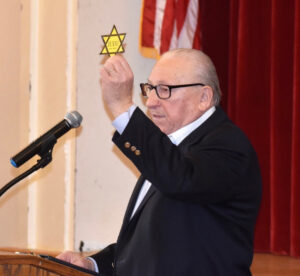
Photo/Courtesy of Friends of March of the Living
NEWTON – There are those who wish to rewrite history or to simply erase it, as if the past is just a bad dream.
Israel “Izzy” Arbeiter is unable to do that. History is written – literally and indelibly – on his left arm. He has spent an entire lifetime telling anyone who will listen about the horrors he endured during the Holocaust, in the hope that such a thing will never happen again.
On October 6, the Greater Boston community will honor Arbeiter for 75 years of Holocaust education at the second annual tribute event, “Voices from the Past: Lessons for the Future” hosted by New England Friends of March of the Living. Arbeiter, now 96 years old, will receive the Stephan Ross Excellence in Holocaust Education Award for the enduring impact of his efforts, both nationally and internationally. This award was named in honor of New England Holocaust Memorial Founder Stephan Ross, who was also a lifelong friend of Arbeiter’s.
The war years
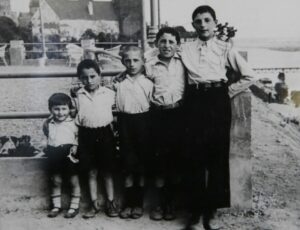
Photo/Submitted
“I was born in Poland, in a little town called Plock,” he began. “When I was 14 years old, World War II broke out, and you know what happened to the Jews. I was with all the Jewish people of the city. Me, my family – my parents, my brothers, had to leave everything behind and go live in the ghetto.”
One fateful day in October 1942, Nazi soldiers came to liquidate the Starachowice Ghetto. They formed two lines, sending elderly people and small children – those unable to work – to one; older youth and strong adults, to another. Arbeiter and three of his brothers belonged to the latter.
Arbeiter attempted to go with his parents at first, but his father knew what standing in that queue meant. He told him to return to his own line, with a final admonition: “Survive. Remember to carry on with the Jewish life, and Jewish tradition.”
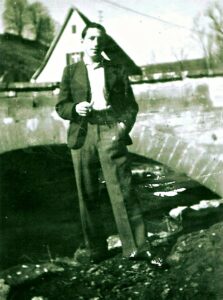
Photo/Submitted
The teenage boy soon learned what happened to his family.
“They took my father, mother and seven-year-old brother to Treblinka,” he said. “My family was murdered. There were six murder camps that were specifically built for killing Jews.”
He spent the next five years in various concentration camps, including Auschwitz-Birkenau.
As Allied forces closed in, SS troops retreated; Arbeiter’s journey to freedom began on April 25, 1945, when his captors fled in the middle of a death march through the Black Forest. It was his 20th birthday; he couldn’t have asked for a greater gift.
“After the war, when the Americans came, we learned that there is another world. People can live in peace,” he said.
Post-war life
Family members in the United States immediately started to work on bringing the surviving boys to America. Arbeiter arrived in 1949 with his wife Anna and their baby girl, Harriet, in tow.
He and Anna met at a labor camp in Poland while she was working in a kitchen and he was working in an ammunition factory.
They settled outside of Boston and became naturalized citizens in 1955. Arbeiter and his surviving brother, Mack, began a tailoring and dry cleaning business. Meanwhile, he and Anna had two more children, Frances and Jack.
But, while he has enjoyed a happy, fulfilling life in America, Arbeiter never forgot his promise to his father. For 15 years, the German government invited Arbeiter to speak in schools, and he went.
“They wanted the young people to know what the Nazis did,” he said. “It is difficult, but somebody has to talk about it.”
Questions, then and now
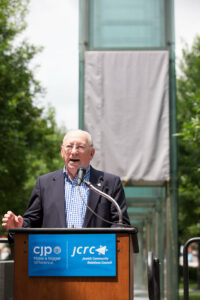
Photo/Courtesy of CJP
Arbeiter has been involved in several educational projects, including a World War II Foundation documentary film entitled, “A Promise to my Father.” Though less often, he continues to speak publicly about his experiences.
“Many times, I wake up at night and I ask myself, Is it true? Did it really happen?” he said. But then he looks at the tattoo on his arm and remembers what he went through as Prisoner A-18651.
“People want to think it is impossible for human beings to do this to other human beings,” he said.
Despite his horrific experiences at the hands of the Nazis, Arbeiter has not become embittered.
“If you let yourself get bitter, you’d turn into the same thing as they were,” he said.
Instead, he remembers his promise, made long ago. When his three grandchildren and four great-grandchildren come to visit, he passes on his experiences and his faith.
As the founder and former president of the American Association of Jewish Holocaust Survivors of Greater Boston, Arbeiter created a legacy – not only for his own family, but also for the families of other survivors. He’s ready for the younger generation to pick up the mantle of leadership and responsibility now.
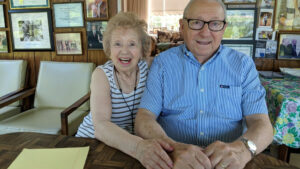
Photo/Courtesy of the World War II Foundation
These days, Arbeiter leads a simple, quiet life. He reads, spends time with his wife, sees his family often and is grateful to be alive. He knows firsthand that every day brings a chance to die, yet offers an opportunity to live.
And that, he says, is enough.












